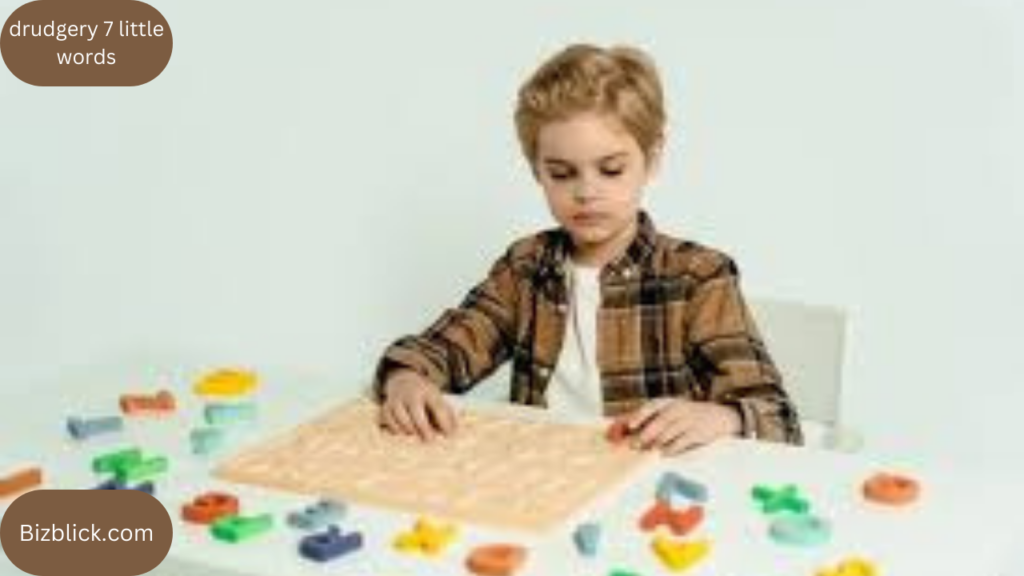Introduction
In the hustle and bustle of daily life, “drudgery” often encapsulates the mundane, repetitive, and laborious tasks we endure. But how does the phrase “drudgery 7 little words” fit into the bigger picture? Beyond being a challenge in a popular word puzzle game, these seven words resonate with deeper meanings, sparking curiosity about their implications in different contexts. This article explores the concept of drudgery, its significance in our routines, and how the “7 little words” puzzle adds a fresh perspective to the understanding of this term.
Decoding Drudgery: What It Means
Drudgery refers to tedious, monotonous, and often physically or mentally exhausting work. Derived from the Middle English word drudgen, which means to labor or toil, it paints a picture of unrelenting effort with little intrinsic reward. Drudgery is frequently associated with tasks that lack creativity or fulfillment, such as household chores, repetitive office duties, or mechanical labor.
Yet, drudgery isn’t always inherently negative. For some, completing mundane tasks provides a sense of structure and purpose. Understanding this duality is crucial in reframing how we perceive and approach routine labor.
The Appeal of “7 Little Words”
“7 Little Words” is a word puzzle game that invites players to solve clues by assembling word fragments into answers. The game’s minimalistic design—just seven clues and letter blocks—hides its complexity. Among its varied clues, the word “drudgery” sometimes emerges, challenging players to think beyond its mundane associations.
In the context of the game, “drudgery 7 little words” becomes more than a phrase; it’s a moment of cognitive engagement. Solving puzzles that include drudgery allows players to interact with the concept on an intellectual level, making the experience both enriching and entertaining.
The Seven Words of Drudgery
What might the seven words describing drudgery be? If we consider common synonyms and related terms, they could include:
- Toil: Hard, continuous work.
- Labor: Physical or mental exertion.
- Effort: A vigorous attempt.
- Monotony: Lack of variety and interest.
- Grind: Tedious and repetitive activity.
- Routine: A sequence of actions regularly followed.
- Burden: A heavy load, both literal and metaphorical.
These words encapsulate the essence of drudgery, highlighting its multifaceted nature. From the daily grind of commuting to the effort invested in personal or professional tasks, these terms reflect the various forms drudgery can take.
Drudgery in Daily Life
For many, drudgery is an inescapable part of life. It manifests in different forms across various spheres:
- Workplace: Repetitive tasks, long hours, or uninspiring projects.
- Home: Chores like cleaning, cooking, or laundry.
- Education: Studying or practicing skills that feel tedious but are necessary for growth.
- Personal Goals: The disciplined effort required to achieve long-term objectives, such as fitness or financial independence.
While drudgery often feels stifling, it’s also a critical component of progress. The repetitive nature of certain tasks builds habits, skills, and resilience, laying the foundation for future success.
Reframing Drudgery: A Positive Perspective
Though drudgery is commonly seen as undesirable, adopting a positive outlook can transform how we experience it. Here are some strategies:
- Mindfulness: Engaging fully in the present moment can make even mundane tasks feel meaningful.
- Purpose: Connecting tasks to a broader goal or purpose can imbue them with significance.
- Gamification: Turning chores into a game—like solving puzzles in “7 Little Words”—adds a layer of fun and motivation.
- Breaks: Regular pauses can make drudgery less overwhelming and more manageable.
By shifting perspectives, we can turn repetitive labor into opportunities for growth and reflection.
The Puzzle Connection: Lessons from “7 Little Words”
The beauty of “7 Little Words” lies in its ability to challenge preconceived notions. When “drudgery” appears as a clue, players must think creatively to solve it. This interaction mirrors life’s challenges, where approaching drudgery with curiosity and strategy can lead to unexpected rewards.
The game also underscores the importance of breaking down large tasks into smaller, manageable pieces. Just as players assemble fragments to form a complete word, tackling drudgery in incremental steps can make it less daunting.
Beyond the Standard: The Broader Implications of Drudgery
“Drudgery 7 little words” is more than a puzzle solution; it’s a metaphor for life’s challenges. The interplay between the mundane and the meaningful reveals the potential hidden within repetitive tasks. By embracing this balance, we can navigate the drudgery of life with grace and determination.
Conclusion
“Drudgery 7 little words” transcends its role in a word puzzle game to offer profound insights into the human experience. Whether it’s through the lens of synonyms like toil and monotony or the mental engagement of solving a puzzle, the concept of drudgery invites us to reflect on how we approach routine tasks. By finding purpose and creativity within the mundane, we can transform drudgery into a source of growth and fulfillment, unlocking new ways to thrive beyond the standard.
